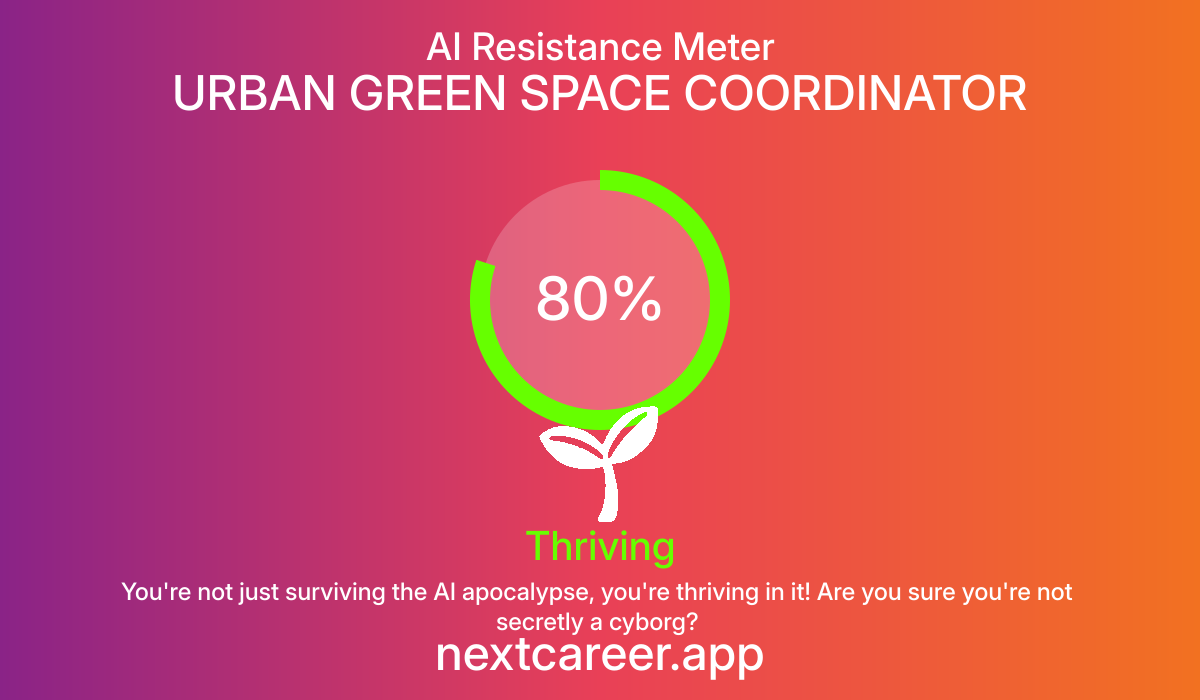AI Resistance for URBAN GREEN SPACE COORDINATOR
AI Resistance Score
AI Resistance Meter
Thriving
URBAN GREEN SPACE COORDINATOR
You're not just surviving the AI apocalypse, you're thriving in it! Are you sure you're not secretly a cyborg?
The Urban Green Space Coordinator role is moderately to highly resistant to AI displacement due to its reliance on creative problem-solving, community interaction, and complex planning which blend ecological understanding with social engagement. While AI can assist in data analysis and logistical tasks, the human element of empathic community relations and adaptive planning for dynamic ecosystems remains a critical component.
The Urban Green Space Coordinator role is moderately to highly resistant to AI displacement due to its reliance on creative problem-solving, community interaction, and complex planning which blend ecological understanding with social engagement. While AI can assist in data analysis and logistical tasks, the human element of empathic community relations and adaptive planning for dynamic ecosystems remains a critical component.
Key Factors
- Community Engagement: Involves interacting with a diverse range of community stakeholders to understand needs and tailor green space projects. Requires empathy and nuanced communication.
- Ecological Understanding and Adaptation: A deep understanding of local ecology and the ability to adapt to changing environmental conditions, which AI currently cannot replicate.
- Data Analysis for Urban Planning: AI can assist in data analysis to optimize layout and functionality of green spaces, yet human oversight ensures alignment with broader ecological goals.
- Policy Navigation: Understanding and working within regulatory frameworks is complex and requires a human touch to negotiate and influence policies effectively.
- Technological Advancements (AI and Sensors): AI and sensor technology can handle monitoring, predicting maintenance needs, and optimizing resource use, potentially reducing human involvement.
Human Advantages
- Creating and maintaining human relationships with community stakeholders
- Understanding complex ecological systems and adapting to changes
- Influencing and navigating policy frameworks
AI Vulnerabilities
- Data analysis for optimizing space utilization
- Predictive analytics for maintenance scheduling
- Monitoring environmental conditions using AI and IoT devices
Recommended Actions
- Develop expertise in AI tools for data analysis to enhance project efficiency.
- Focus on community engagement skills through workshops and communication training.
- Pursue interdisciplinary learning to integrate ecological science with social policy.
- Advocate for policies that support the role of humans in environmental stewardship.
- Explore creative uses of emerging technologies to enhance public engagement in urban planning.
In the near term (5 years), AI will increasingly support Urban Green Space Coordinators by optimizing logistical and analytical tasks. However, the role's emphasis on community engagement and ecological understanding ensures continued human involvement. Long-term (20+ years), the role may evolve to integrate more technological tools like AR for planning and virtual community forums, but the central human element in policy and relationship building will persist. As environmental concerns become more critical, the demand for roles that blend technology with human-centric environmental stewardship is expected to grow.
